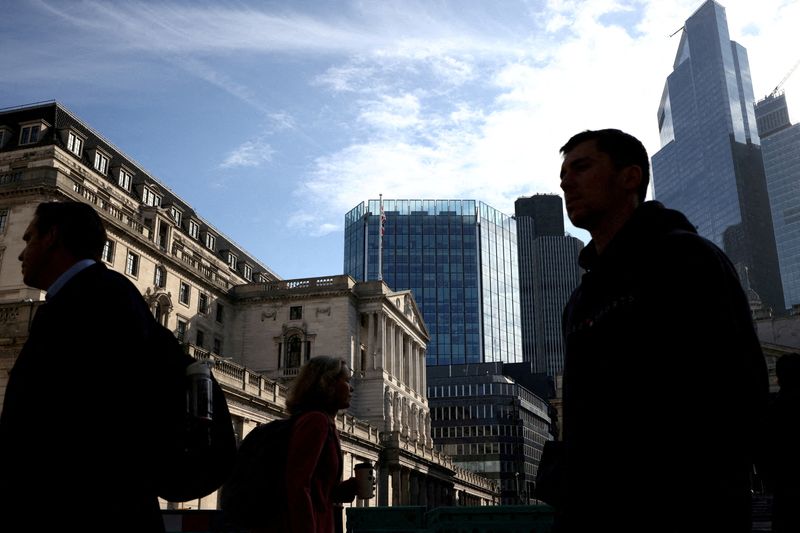By Sinead Cruise, Iain Withers and Lawrence White
LONDON (Reuters) -The war of words between NatWest (LON:NWG) and erstwhile customer Nigel Farage has underscored the challenges global banks face in handling clients who could be defined as a politically exposed person, or PEP.
Banks are obliged to deny services to individuals subject to international sanctions or who are suspected of money-laundering or financing terrorists.
Lenders are obliged to apply extra scrutiny to customers identified as PEPs under international standards, but they are prohibited from ceasing business with customers who clash with their self-proclaimed institutional values.
Top UK regulators and government ministers have spoken out in defence of freedom of expression, and have said banks should not bar non-sanctioned customers on political grounds.
CAN MY BANK CLOSE MY ACCOUNT IF MANAGEMENT OBJECT TO MY POLITICS?
Banks are prevented by law from discriminating against customers on the basis of their political views. The UK government is seeking to tighten supervision of banks suspected of making politically motivated decisions to deny services to customers who hold lawful opinions.
But expressing views on race that may be construed as inciting racial hatred could serve as justification for jettisoning a customer, as this is considered an offence under UK law.
Banking lobby group UK Finance said last week that lenders could close an account for several reasons but must treat customers fairly.
Closing accounts for commercial reasons is permitted, such as when an private banking or wealth management account falls below a certain threshold in size.
In 2017, French far-right politician and former presidential runner Marine Le Pen accused HSBC (LON:HSBA) and Societe Generale (EPA:SOGN) of a "banking fatwa" after her accounts and accounts linked to her party were shuttered by the lenders.
Commenting at the time, HSBC said its relationships with customers were "governed by a set of regulatory obligations that we comply with", while SocGen said decisions on whether to open or close accounts rested entirely on banking and regulatory reasons, without "any political consideration."
The CEO of Britain's biggest domestic bank Lloyds (LON:LLOY) told reporters on Wednesday after the bank's earnings that the company's policy did not include any consideration of their political or personal beliefs.
WHAT ARE REGULATORS DOING TO PROTECT CONSUMERS VULNERABLE TO ACCOUNT CLOSURES ON POLITICAL GROUNDS?
Under new UK rules proposed by Financial Services Minister Andrew Griffith, banks will need to clearly explain any closure and customers will be given more time - 90 days - to challenge a decision through the Financial Ombudsman Service, or find a replacement bank.
Griffith has made clear he wants banks to begin applying the changes "without delay", though a customer's failure to keep up with payments could be grounds for closing an account more quickly.
The UK is also proposing a lighter-touch screening of domestic PEPs compared with non-UK customers who share that status.
Britain's policing minister Chris Philp told the BBC on Wednesday that many lawmakers had been turned down by banks because of PEP rules, adding banks had been "overzealously interpreting" the rules.
HOW CAN I FIND OUT IF BANKS ARE TREATING ME UNFAIRLY BECAUSE OF MY POLITICAL BELIEFS?
Customers could try to uncover the reasons behind any unexpected account closure via a Subject Access Request or SAR. Under UK General Data Protection Regulation also known as GDPR, a customer can apply to see copies of personal, confidential data held by any organisation or company bound by these rules.
Banks have a legal responsibility to identify and handle any request from an individual correctly, or could face censure from the Information Commissioner's Office.
The All-Party Parliamentary Group on Fair Business Banking, supported by City law firm Humphries Kerstetter LLP, said on Wednesday it had launched an investigation into the scale and practice of banks freezing, withdrawing or withholding bank accounts.
The APPG has asked companies, individuals and banking professionals to submit case studies about how and why banking facilities are being denied and the impact of this on businesses and the wider economy.
WILL THE REFORMS IMPACT BANKS' EFFORTS TO CLAMP DOWN ON FINANCIAL CRIME?
Banks are required by law to check that money they safeguard for customers or prospective customers is legally earned and will not be used to finance terrorism or other crime.
Some individuals innocent of wrong-doing might end up ensnared in well-meaning efforts by banks to eliminate criminality in the banking system.
Lawyers have also expressed concerns the new rules may prevent lenders from "tipping off" potential suspects to enforcement authorities.
"Access to the banking system is just as vital to democracy as free speech. And just like speech, most people would agree that an excess of regulation is terrible, yet certain restrictions are valid," Blake Harris, managing partner of Blake Harris Law, told Reuters.

"Many people would agree that speech that promotes violence should be banned. It seems logical then that using the banking system to promote violence or terrorism, should also be banned."
Griffith said his new rules will include "limited exceptions" to ensure banks are not interfering with investigations into criminal activity, and to protect their ongoing compliance with financial crime rules.